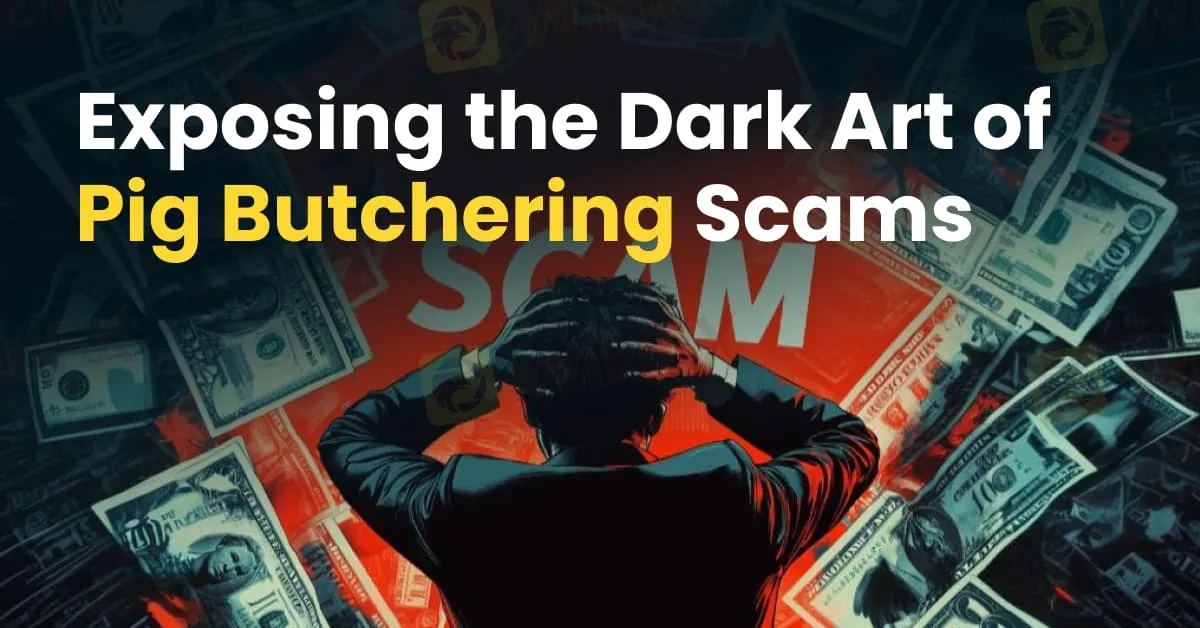简体中文
繁體中文
English
Pусский
日本語
ภาษาไทย
Tiếng Việt
Bahasa Indonesia
Español
हिन्दी
Filippiiniläinen
Français
Deutsch
Português
Türkçe
한국어
العربية
Exposing the Dark Art of Pig Butchering Scams
Abstract:A new type of scam is spreading fast through the world of online trading and cryptocurrency. It’s called the "pig butchering" scam. The term “pig butchering” comes from a Chinese phrase, “Sha Zhu Pan”, which describes the way a scammer treats their victim like a pig by slowly “fattening” them up with kindness and attention before “butchering” them for money.

A new type of scam is spreading fast through the world of online trading and cryptocurrency. Its called the “pig butchering” scam. This scam combines fake investment advice with emotional manipulation. Many people, even smart investors, have lost their savings to it.

The term “pig butchering” comes from a Chinese phrase, “Sha Zhu Pan”, which describes the way a scammer treats their victim like a pig by slowly “fattening” them up with kindness and attention before “butchering” them for money. It is not a quick scam. It takes time and patience, and it often begins with what seems like a normal conversation on a dating app, social media site, or even a professional platform like LinkedIn.
The scammer builds a relationship with the victim, pretending to be a friend or romantic partner. They may talk about their success in trading or investing and soon offer to help the victim do the same. It feels like a kind gesture, but its the start of the trap.

Once the victim feels they can trust the scammer, they are invited to join a trading platform, usually one that looks professional and well-designed. The scammer will guide them through the process, helping them invest small amounts at first. Often, these early investments appear to be successful, with fake profits that can even be withdrawn. This builds confidence and encourages the victim to put in more money.
But when the victim tries to withdraw larger amounts, problems begin. The platform will suddenly say that taxes or extra fees must be paid first. In some cases, all contact with the scammer stops, and the victim is left with nothing.
Why This Scam Is So Dangerous
The pig butchering scam is more harmful than many other frauds because it uses emotions as well as lies. People don‘t just lose money, but they also lose trust in others, which can be deeply painful. These scams work so well because they make people feel special, supported, and even loved. That’s what makes the final betrayal so cruel.
How to Protect Yourself
Be careful if someone you dont know well starts giving you investment advice, especially if you met them online. If the person wants to move the conversation away from a trusted platform, like a dating site or social network, that can be a warning sign.
Always double-check any investment platform before you use it. Look up reviews online and check if the company is registered with a real financial authority. If youre unsure, speak to a professional adviser.
It‘s also wise to keep love and money separate. If someone you’ve just met wants to mix romance and investing, take a step back. This is a common tactic used in the scam.
Finally, listen to your instincts. If something feels too good to be true, like big profits with no risk, it probably is. Scammers often create a sense of urgency or pressure to act fast. That alone should make you pause.
As online trading grows, so do the tricks used to take advantage of it. Staying alert and asking questions is the best way to stay safe. Don‘t let yourself be fattened up for someone else’s profit.

As incidents like this become increasingly common, tools such as WikiFX can play a vital role in helping individuals verify the legitimacy of brokers and financial platforms. WikiFX offers an extensive database of global broker profiles, regulatory status updates, and user reviews, enabling users to make informed decisions before committing to any financial investment. Its risk ratings and alerts for unlicensed or suspicious entities help investors easily spot red flags and avoid potential scams. By using tools like WikiFX to research a broker's background, individuals can safeguard their hard-earned savings and reduce the risk of falling victim to fraudulent schemes.

#ScamBrokersHotTopics
Disclaimer:
The views in this article only represent the author's personal views, and do not constitute investment advice on this platform. This platform does not guarantee the accuracy, completeness and timeliness of the information in the article, and will not be liable for any loss caused by the use of or reliance on the information in the article.
Read more

AssetsFX Scam Alert: 5 Troubling Signs
Forex trading has become a critical game now because of advancements in technology. Due to this Unfortunately, scam brokers have also entered in the Forex market. Therefore, you need to stay alert. This article aims to warn all traders and investors. Read carefully and stay aware.

Forex4Money: Where Your Money Goes In, But Never Comes Out!
Discover how Forex4Money traps investors with fake profit promises and blocked withdrawals. Read real complaints and protect yourself from this unregulated forex scam.

What are Indian Traders saying about MINTCFD?
MINTCFD is an India-based broker. It's important to note that independent watchdogs have issued scam alerts against the broker. They label MintCFD as risky and possibly fraudulent. In this Article, we will tell you the red flags of MINTCFD to protect your money

Scam Alert: FCA Issued Warning! Check the List of Unauthorized Brokers Below!
Attention Traders! Never ignore a warning from a trusted authority like the UK’s FCA. If you do, you could risk losing your money. Check the list below of Scam forex brokers to protect yourself.
WikiFX Broker
Latest News
Interactive Brokers Expands Forecast Contracts to Europe
CNBC's Inside India newsletter: Why an India-U.K. trade deal does not make U.S.-India agreement any easier
Fraud Alert: 5 Issues You Might Face with Binomo
OpenAI spearheads one of Europe's biggest data centers with 100,000 Nvidia chips
Silver in Correction Mode: Navigating the Precious Metal’s Pullback
Webull Pay Reviews 2025: Details Compared
Doctor Trapped by 520% Profit Promise, Loses RM8.7 Million
CVS shares pop on earnings beat and outlook, as retail pharmacy and insurance units improve
Robinhood Gains 2.3M New Accounts, Platform Assets Close to $280B
Amazon earnings primer: Why AI and tariffs are key to the second quarter
Currency Calculator


